 Petzlover
Petzlover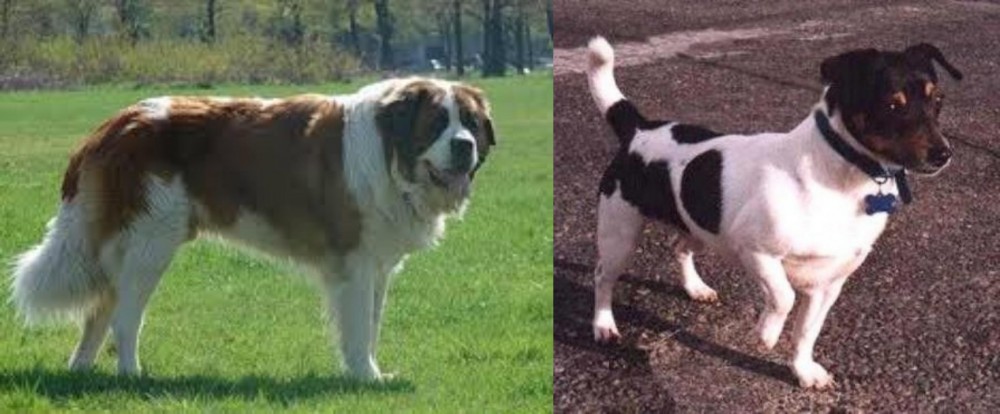 Moscow Watchdog is originated from Russia but Teddy Roosevelt Terrier is originated from United States. Moscow Watchdog may grow 33 cm / 13 inches higher than Teddy Roosevelt Terrier. Moscow Watchdog may weigh 57 kg / 126 pounds more than Teddy Roosevelt Terrier. Moscow Watchdog may live 5 years less than Teddy Roosevelt Terrier. Moscow Watchdog may have more litter size than Teddy Roosevelt Terrier. Both Moscow Watchdog and Teddy Roosevelt Terrier requires Moderate Maintenance.
Moscow Watchdog is originated from Russia but Teddy Roosevelt Terrier is originated from United States. Moscow Watchdog may grow 33 cm / 13 inches higher than Teddy Roosevelt Terrier. Moscow Watchdog may weigh 57 kg / 126 pounds more than Teddy Roosevelt Terrier. Moscow Watchdog may live 5 years less than Teddy Roosevelt Terrier. Moscow Watchdog may have more litter size than Teddy Roosevelt Terrier. Both Moscow Watchdog and Teddy Roosevelt Terrier requires Moderate Maintenance.
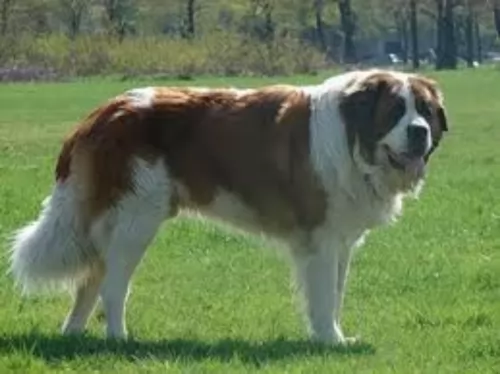 The Moscow Watchdog is a cross between the Caucasian Oytcharka, the St. Bernard and other Russian hound dogs. This large breed dog was developed in the Soviet Union for the purpose of being guard dogs. It had the awareness and assertiveness of the Oytcharka and the size, intelligence and attractiveness of the St. Bernard. The breed is common in Russia today but hardly seen anywhere else even though they were exported to the United States and Europe. The breed had the first U.S. born litter in 2015 and it is not AKC recognized.
The Moscow Watchdog is a cross between the Caucasian Oytcharka, the St. Bernard and other Russian hound dogs. This large breed dog was developed in the Soviet Union for the purpose of being guard dogs. It had the awareness and assertiveness of the Oytcharka and the size, intelligence and attractiveness of the St. Bernard. The breed is common in Russia today but hardly seen anywhere else even though they were exported to the United States and Europe. The breed had the first U.S. born litter in 2015 and it is not AKC recognized.
Following the second world war crime was on the rise in the Soviet Union and a new breed of dog was needed to counter this trend. The dog had to be adaptable to very cold temperatures, snowy weather and have a guard dog personality and ability. The breed was called on to guard such locations as railroads, government offices, warehouses, infrastructure and labor camps.
The project to develop this breed was led by General Medvedev beginning in 1946 at the Central School of Military Kynology – which was a department of the Soviet Ministry of Defense. It took many years to develop the Moscow Watchdog which then became a very successful breed.
It took until 1985 for the breed to be “officially” recognized in the Soviet Union and until 1992 to be recognized by the Federation of Dog Breeders in Russia and until 1997 for the standard to be approved by the Russian Kennel Club. They are still working with the FCI to gain international recognition for the breed. At the moment they are considered a part of the Molosser group and shown in the “Special Show” in Russia.
Committed breeders brought the Moscow Watchdog to Hungary in 1986 in order to make the breed more popular. In addition to this there were many breeders from previous Soviet States that wanted to preserve the breed as well. There were about 500 Moscow Watchdogs in Hungary around then. Currently there are about 27 Moscow Watchdogs in the United States. The breed is known to be a gentle giant and very much a family dog these days.
 Teddy Roosevelt Terriers (Teddy, American Teddy) are American hunting terriers related to American Rat Terriers and a host of other working, farm, hunting dogs initially brought by working-class immigrants from England and Europe. Largely due to the working nature of these dogs early the cross breeding was to reinforce useful traits like a superior ability to scent prey. It also bequeathed the breed with superior intelligence. While they take a while to warm up to new people, to their human family they like to be close all the time, and are eager to be with them and please them. Teddy's share their early history with American Rat Terriers, Fox Paulistinha, Tenterfield Terrier and Beagles. They also are related to Feist (dog), and Turnspit dogs, English White Terrier and Wry-legged terrier (all now extinct), as well as Bull, Smooth Fox, Manchester Terriers with Beagles, Italian Greyhound and Whippets in the mix.
Teddy Roosevelt Terriers (Teddy, American Teddy) are American hunting terriers related to American Rat Terriers and a host of other working, farm, hunting dogs initially brought by working-class immigrants from England and Europe. Largely due to the working nature of these dogs early the cross breeding was to reinforce useful traits like a superior ability to scent prey. It also bequeathed the breed with superior intelligence. While they take a while to warm up to new people, to their human family they like to be close all the time, and are eager to be with them and please them. Teddy's share their early history with American Rat Terriers, Fox Paulistinha, Tenterfield Terrier and Beagles. They also are related to Feist (dog), and Turnspit dogs, English White Terrier and Wry-legged terrier (all now extinct), as well as Bull, Smooth Fox, Manchester Terriers with Beagles, Italian Greyhound and Whippets in the mix.
Only since 1996 have Teddy Roosevelt Terriers had standards set for the breed. The major difference between Teddys and the related American Rat Terrier is Teddys are closer to the ground (bench-legged), have greater bone density and more muscle. Teddys are medium to small sized. It was in the mid 1990's that the effort began to breed only the shorter legged phenotype into the Teddy lineage and allow the rat Terrier to be the longer legged variety. The UKC (United Kennel Club) and AKC (American Kennel Club) both recognize Teddys, the UKC since 1999.
The Rat Terrier Club of America separated the long legged and short legged varieties, the short legged ones were named in honor of President Theodore Roosevelt. It is rather interesting that President Theodore Roosevelt, while being very fond of his family dogs did not own any Rat Terriers, and did not help develop the breed that bears his name. He mentions dogs in several of his letters, Skip who rode with the president on his horse while hunting and belonged to a friend, Scamp who lived with the Roosevelt's in the White House and hunted and caught rats and their dog Jack.
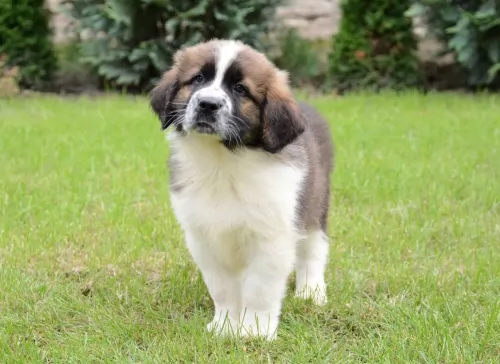 The Moscow Watchdog is related to the mountain dogs and is a very large breed. They are sturdy, muscular and powerful. They have big heads and a thick double coat that sheds profusely four times a year. They have a long tail, an arched chest and an air of confidence.
The Moscow Watchdog is related to the mountain dogs and is a very large breed. They are sturdy, muscular and powerful. They have big heads and a thick double coat that sheds profusely four times a year. They have a long tail, an arched chest and an air of confidence.
He is in the Mastiff family and is smart and trainable. He is not clumsy but has big bones. He is surprisingly agile and active for a dog his size. Unlike the St. Bernard he is not a couch potato. He is also differentiated from the St. Bernard because he does not drool.
These dogs are large but they’ve got a gentle temperament and are good with kids, being playful and energetic with them.
Even though he is a docile dog, you want him trained and socialized, and then he gets along well with other pets too. His sheer size makes it that it is best to supervise him when he’s around small children. He is also a protective dog breed, willing to bond closely to, and protect his human family.
 Teddy Roosevelt Terriers are hunting terriers that are short legged, well muscled and very active. They have proportionate wide, sightly rounded heads cuneus (wedge) shaped on which the V shaped ears are set on the outside edge. Their ears may be button or erect, and breed standards prefer a docked tail, but it is not necessary. Ideally Teddy's have length/height ratio is 10/7 or 10/8. The Teddy Roosevelt Terriers coats may be solid white, other colors with patches and markings. Their coats are short and rough. Because they are working dogs, what is termed as “honorable” scars from work are not deducted from the dogs points. If the dog is not proportionate to breed standards (for example long legs or square body) it may be disqualified, but exaggerations and faults are marked only is in as much as it interferes with the ability to work. They are very pleasant looking and have a lively manner.
Teddy Roosevelt Terriers are hunting terriers that are short legged, well muscled and very active. They have proportionate wide, sightly rounded heads cuneus (wedge) shaped on which the V shaped ears are set on the outside edge. Their ears may be button or erect, and breed standards prefer a docked tail, but it is not necessary. Ideally Teddy's have length/height ratio is 10/7 or 10/8. The Teddy Roosevelt Terriers coats may be solid white, other colors with patches and markings. Their coats are short and rough. Because they are working dogs, what is termed as “honorable” scars from work are not deducted from the dogs points. If the dog is not proportionate to breed standards (for example long legs or square body) it may be disqualified, but exaggerations and faults are marked only is in as much as it interferes with the ability to work. They are very pleasant looking and have a lively manner.
Teddy Roosevelt Terriers are happy when they are the constant companion of their owner(s) and will shadow their master all day. Temperamentally they love to play, do well in obedience training and are territorial and protective and are exceptional watch dogs. Of course, they were bred as hunting dogs and have hunting instincts, a greater than median prey drive and will chase anything they consider prey such as rabbits, squirrels, birds, stray cats, (and if not trained poultry), as a working dog training is really important. With a heightened sense of smell and superior prey drive, Teddy's have been observed to follow and dig along mole trails (adding further damage to what the moles may have already inflicted), as well as ferret out edible mushrooms.
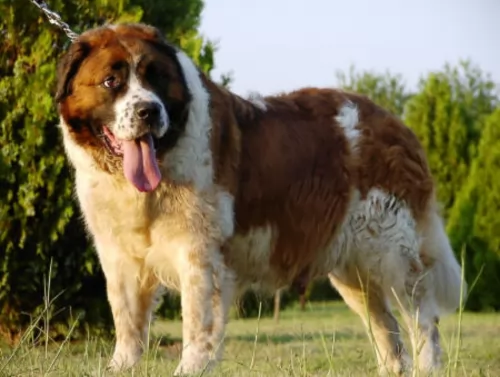 This is a large dog who likes to be involved and busy, even though he is so big. He isn’t suited to city life and being confined to a tiny garden as he needs space.
This is a large dog who likes to be involved and busy, even though he is so big. He isn’t suited to city life and being confined to a tiny garden as he needs space.
They’re independent dogs too and you can leave them alone during the day. He is social, so while you can leave them during the day while you’re at work, he’ll want your attention when you get back. They're such loving, loyal family pets that you owe it to him to make this gentle giant of a dog as happy as can be.
 1.Children friendliness yes Teddy's love to play and enjoy children. Enjoys spending time with family and interacting with their human family taking part in the everyday routines.
1.Children friendliness yes Teddy's love to play and enjoy children. Enjoys spending time with family and interacting with their human family taking part in the everyday routines.
2.Special talents The breed has high prey drive and an very intense sense of smell One of their talents is to be trained to find, by scent, Black Truffles (a type of edible mushroom) found close to the roots of some trees in the Western half of North America.
 Moscow Watchdog is looked upon as a fairly healthy dog breed but there are some risks such as hip dysplasia as well as some other large breed problems.
Moscow Watchdog is looked upon as a fairly healthy dog breed but there are some risks such as hip dysplasia as well as some other large breed problems.
With big dogs like this, hip dysplasia is a threat. Its an hereditary condition where the parent dogs pass down the problematic genes. Hip dysplasia results in inflammation and pain for your pet, and where once he loved to play, he is reluctant to and battles to get up after lying down.
 • Ectopia lentis a congenital problem where the lens of the eye is displaced. Eye disease
• Ectopia lentis a congenital problem where the lens of the eye is displaced. Eye disease
• bite problems (malocclusions -teeth that are incorrectly aligned when jaw is closed.),
• Hip dysplasia, elbow dysplasia, (hip or elbow socket that does not fully cover the ball which increases the risk of displacement.
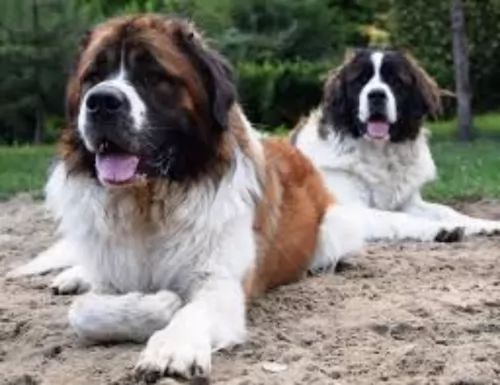 The Moscow Watchdog is a giant sized dog and will require a lot of regular exercise, and apart from a fairly brisk daily walk, will also need games and a run in the park.
The Moscow Watchdog is a giant sized dog and will require a lot of regular exercise, and apart from a fairly brisk daily walk, will also need games and a run in the park.
As a large dog requiring a regular dose of physical exercise as well as mental stimulation, he is better suited to life in the country or at least where there is a large garden.
The Moscow Watchdog has a medium length coat, and as a moderate shedder, you will need to simply brush his coat twice a week to remove loose hair. There is no professional grooming required for these dogs.
Homemade food is always a treat for a dog, but if you’re feeding your Moscow Watchdog commercially manufactured food because of the sheer convenience it provides, make sure the packaging says 'large- or giant dog breed' food. This way you know your pet is getting the right amount of minerals and vitamins for his size.
Always buy the best quality food to avoid giving your pet an overdose of colorants and preservatives. Try and give your pet some home-made food such as boiled chicken, some brown rice or pasta and some cooked vegetables such as sweet potatoes, carrots and spinach. These can be added to his kibble every now and again.
A simple diet like this agrees with your pet and he will be healthy and happy with his lot.
 1 Feeding the puppy Puppies should eat a minimum of a cup and max of a cup and three quarters each day. 1-13/4
1 Feeding the puppy Puppies should eat a minimum of a cup and max of a cup and three quarters each day. 1-13/4
2.Feeding the adult Adult Teddy Roosevelt Terriers should eat three-fourth to one-and-a-half cups per day.
3.Points for Good Health - fairly healthy The Teddy Roosevelt Terriers displays some common joint issues that are shared by Rat Terriers.
4. Games and Exercises Having descended from hunting/working dogs Teddy Roosevelt's are able to learn and work conformation rings, and agility trials. They like to play and take part in swims, hikes and playing fetch or Frisbee. They take well to obedience training.